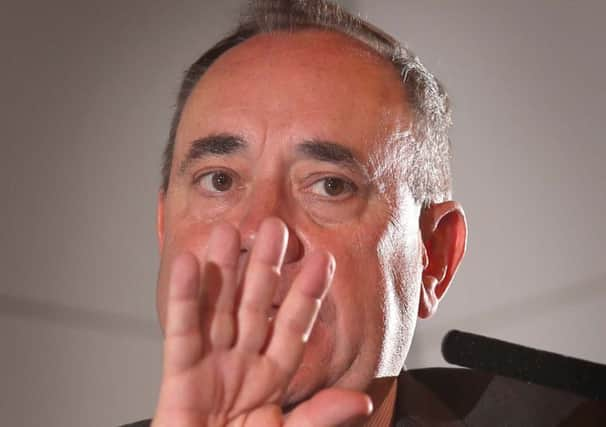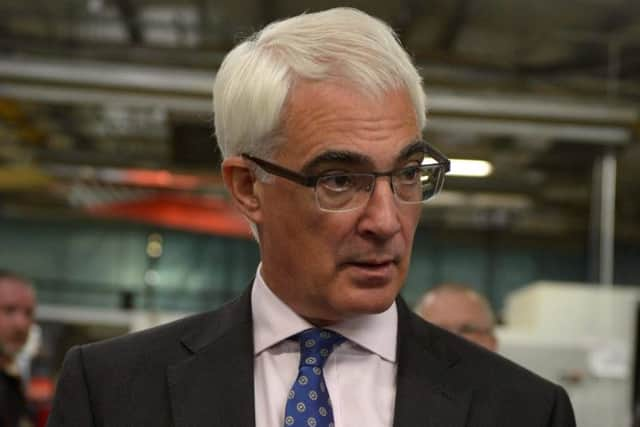Plan B or not Plan B: Salmond rejects the question


With Better Together claiming that Alistair Darling had demolished the SNP’s key economic policy, the First Minister yesterday set out in detail his plans for an independent Scotland to share the pound after independence.
Amid concern within the SNP that Mr Salmond had not performed well enough to attract undecided voters, he was also offered advice by an independence-supporting businessman when he attended a Business for Scotland meeting yesterday.
Advertisement
Hide AdAdvertisement
Hide AdThe businessman suggested that Mr Salmond had spent too much time quoting other people and had not concentrated enough on the shortcomings of the Westminster system in terms of its treatment of the NHS and its involvement in wars in recent years.


When challenged by Mr Darling during the televised debate, Mr Salmond shied away from saying what his Plan B would be if, as the UK government has indicated, an independent Scotland would not be allowed to share the pound in a formal currency union.
At the Business for Scotland event at Our Dynamic Earth in Edinburgh, Mr Salmond said it was of the utmost importance to underline the Scottish Government’s commitment to a currency union to ensure that sharing the pound was the “sovereign mandate” of the Scottish people in the event of a Yes vote.
To explain his reluctance to explore any other currency options when confronted by Mr Darling on Tuesday, he said: “It is very important in the sterling debate to make sure that no-one can say that you are not committed to the currency union as proposed in the white paper.”
Sticking to the current currency union policy in the white paper – which people would have effectively voted Yes on – would make the Scottish Government’s stance clear when it came to the post-independence negotiations with the UK government, Mr Salmond suggested.
“Therefore, there is no doubt of the sovereign mandate of the Scottish people if there is a Yes vote in the referendum,” Mr Salmond added.
Looking at the other options, Mr Salmond ruled out joining the euro. He said it did not seem sensible because of the transaction costs between Scotland and England.
He added one advantage of using sterling without a formal currency union was that if the UK denied Scotland its share of its assets in terms of the pound, then there would be no entitlement for the newly independent nation to take on a share of the UK’s £1.3 trillion debts.
Advertisement
Hide AdAdvertisement
Hide Ad“So that would be quite attractive, but obviously it tells you why it ain’t going to happen. There is no way a UK chancellor is going to allow himself to be in a position where Scotland gets off scot free in terms of the debt,” Mr Salmond said.
He also said Mr Darling resorted to being “shouty man” in the TV debate, and added: “I am absolutely certain the way to not just win this campaign, but to win the hearts and minds of the people, is to have a discussion.”
After speaking at the Business for Scotland event, Mr Salmond took the relatively rare step of attending Holyrood’s weekly group meeting of MSPs – a move that was interpreted as an attempt to rally the troops the day after his clash with Mr Darling.
One SNP insider said: “I have spoken to a few people who were not that impressed. The general view is that he could have performed better and did not hit the target.”
Mr Salmond’s aides conducted their own analysis of an ICM poll, conducted for The Guardian newspaper as the debate happened, to argue that Mr Salmond had won over undecided voters and female voters. Their analysis, however, was disputed by independent experts on the basis that the sample of 512 people was too small to draw such conclusions accurately.
Professor John Curtice, from Strathclyde University, said: “Given the numbers involved, we cannot discount the proposition that, basically, the debate did not make a difference. There is no consistent evidence that Yes made any advance.”
Mr Darling stepped up his attacks on Mr Salmond when he visited Fife Fabrications, a business based in Glenrothes employing 80 people, which has criticised the lack of a Plan B.
The Better Together leader said: “[Salmond’s] failure to reveal Plan B means that companies like Fife Fabrications look at his plans to break up the UK and say No Thanks.
Advertisement
Hide AdAdvertisement
Hide Ad“As part of the UK, our companies can sell to a domestic market of 63 million rather just five million. Alex Salmond wants to put that at risk.
“We don’t have to risk jobs on his blind faith and guesswork. We can have the best of both worlds in Scotland – a strong Scottish Parliament with more powers guaranteed for Scotland, backed up by the strength, security and stability of the UK.”
SEE ALSO